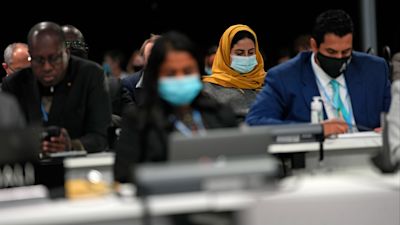Insight
COP26: Four key takeaways from the climate change conference draft proposal

ITV News Deputy Political Editor Anushka Asthana explains the key points you need to know from the final day of COP26
There has been mixed reaction to the latest draft of the COP26 final text, which will continue to be negotiated throughout today and into the night, before the climate change conference ends this weekend.
Here are the key takeaways from the second version of the draft. Softer approach towards phasing out fossil fuels The term 'fossil fuels' remain in this document – the first time they’ve been mentioned in any text drawn up at a COP since the conferences began.
However, campaigners will be disappointed by the weakening of the language here.
The first draft, published in the early hours of Wednesday, called on countries to “accelerate the phasing out of coal and subsidies for fossil fuels” - to the delight of climate campaigners. That wording has been under intense pressure and now it talks about “the phase-out of unabated coal power and of inefficient subsidies for fossil fuels”.
The World Resources Institute argued that the inclusion of “unabated” (which means coal emissions that aren’t captured back, for example by carbon capture and storage) and “inefficient” had been demanded by countries with big interests here like Saudi Arabia, but said that it was good it remained.
However, Polly Mackenzie, who was a senior adviser to the government during the coalition years, pointed out that leaving room for “efficient” subsidies was bad news as they were the ones most damaging.
Climate target timetable more flexible
There is some argument over the change in this paragraph in the text. It has shifted from the first draft that “urges” countries to strengthen their 2030 climate targets (known as nationally determined contributions or NDCs) by the end of 2022.
This accelerated timetable is seen as so critical as we remain way off track for limiting heating below 1.5C. Let’s be clear – we were never going to see that gap closed in Glasgow – but the summit was about keeping the hope alive, and that is only possible if the action improves year on year during this decade that scientists insist is critical.
That paragraph now “requests” countries return to and strengthen those targets by the end of next year. That is weaker language. However, it is still there, with the 2022 date – and some experts argue that "requests" remains decent language, if less strong.
The paragraph also adds “taking into account different national circumstances” which can be seen as a positive because it could pile pressure on the biggest emitters whose action will have a bigger impact overall.
Acknowledging loss and damage may set new precedent
Here there is a positive reaction to a step in a good direction to help protect the poorest countries. Expert after expert has told us that the first draft was “unbalanced” – with heavy emphasis on mitigation (action to reduce emissions) at the expense of a focus on adaptation.
They've argued that adaptation would help countries to protect themselves against - and recover from - the already existing impacts of climate change. This concept has been referred to at COP as "loss and damage".
One point is that campaigners want 50% of the money in the $100 billion (£75 billion) annual financing from richer to poorer countries to be focused on adaptation. This draft urges developed countries to double their provision on adaptation by 2025 (which would take it to $40 billion (£30 billion)) so that is a good thing. Loss and damage is difficult – historically western countries have refused to allow this into the COP texts because of a sense that it is equivalent to developed countries admitting liability for the damage of climate change across the world.
ITV News Correspondent John Ray on how Malawi, one of the poorest countries in the world, bears the brunt of climate change
By simply including loss and damage and urging countries to “provide enhanced and additional support for activities addressing loss and damage associated with the adverse effects of climate change” – that is changing the precedent. It is significant, but it isn’t concrete action and actual money. So in summary, it's a good move that's far from perfect. Regulatory loopholes may shrink
Finally is the unbelievably complicated “Paris rulebook” which has yet to be closed (six years after the original conference) and which regulates the ways in which countries report their progress towards climate goals. This is significant because countries are pushing for loopholes that could undermine the real progress that we see.
The view across campaigners I speak to is there is still someway to travel on this, with a number suggesting that on this “no deal is better than a bad deal” – ie. – that they shouldn’t agree to anything that will allow countries to cheat their climate talks. It could be that – on that – the discussions continue.